Text
GOD HAS A PERSONAL NAME!
“God” and “Lord” and “Creator” are titles like “king” and “president”. God has many titles, but he also has only one personal name. God reveals his personal name YEHOVAH (יְהֹוָה) in the Hebrew text of the Bible about 7,000 times (Exodus 3:15; Psalm 83:18; Isaiah 45:18).
Most Bible translations have substituted the title “LORD” for the personal name Yehovah, thus hiding the name that God himself revealed to mankind. And some people say that God’s name must not be uttered. But God forbids not the use but the misuse of his holy name (Exodus 20:7; Leviticus 24:10-16). The Torah, the Law, even contains commands that required God’s people to pronounce God’s name (Numbers 6:22-27; Deuteronomy 6:13).
All Hebrew names have a meaning. God’s name Yehovah means “The One Who Causes To Become”, “The One Bringing Into Existence” (see Brown-Driver-Briggs 3068 YHVH, 2). The first of the scriptures in which the four Hebrew consonants YHVH (יהוה) appear with all three wovels e-o-a in the Leningrad Codex, the oldest complete copy of the Hebrew Scriptures, is Genesis 3:14.
We can see God’s name also in countless personal names of the Israelites. One example is the Hebrew name Yehonatan, which is in English: “Yehovah has given” (Nehemiah 12:18). YAH (יָהּ) is the shortened form of God’s name. This shortened form is in the end of many Hebrew personal names, and in the Hebrew expression “halelu Yah”, which is in English: “Praise Yah” (Psalms 113:1).
God’s name serves as a guarantee and as a reminder that all his promises and his purpose will be fulfilled no matter what. Over and over again the Creator says in his written Word: “You will have to know that I am Yehovah”, that is, “You will have to know that I am The One Who Causes To Become [or, The One Bringing Into Existence]” (Ezekiel 37:13).

18 notes
·
View notes
Text
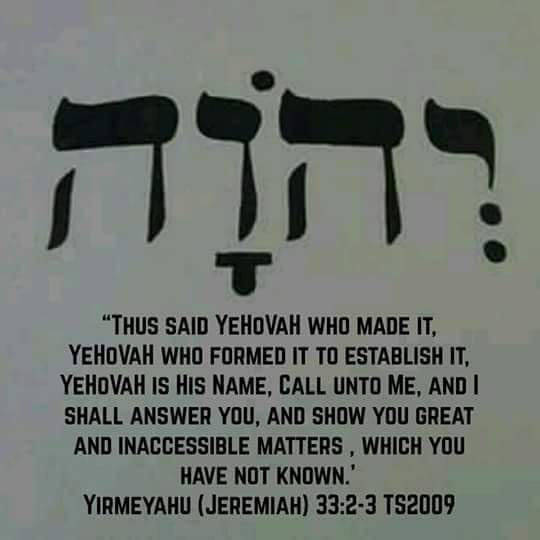
God is not His Name. God is a title which all the sun-gods also use. YEHOVAH is His name that He told us to call upon.. Lord is a title also not His name.
9 notes
·
View notes
Text
WHAT APOSTLE PAUL DO YOU FOLLOW?
1. Paul told us to follow his example.
Php 3:17 Brothers, join in imitating me, and pay attention to those who live according to the pattern we have set for you.
2. Paul always kept the Shabbat.
Act 17:2 According to his usual practice, Sha'ul went in; and on three Shabbats he gave them drashes from the Tanakh,
Acts 18:4 Sha'ul also began carrying on discussions every Shabbat in the synagogue, where he tried to convince both Jews and Greeks.
3. Paul kept the Feast Days.
Act 20:6 while we sailed from Philippi after the Days of Matzah. Five days later, we met them in Troas, where we spent a week.
Act 20:16 For Sha'ul had decided to bypass Ephesus on his voyage, in order to avoid losing time in the province of Asia, because he was hurrying to get to Yerushalayim, if possible in time to celebrate Shavu`ot.
4. Paul instructed us to keep the Feast Days.
1Co 5:7 Get rid of the old hametz, so that you can be a new batch of dough, because in reality you are unleavened. For our Pesach lamb, the Messiah, has been sacrificed.
1Co 5:8 So let us celebrate the Seder not with leftover hametz, the hametz of wickedness and evil, but with the matzah of purity and truth.
5. Paul believed all of the Torah and was not a Christian, but a follower of the Way.
Act 24:14 "But this I do admit to you: I worship the God of our fathers in accordance with the Way (which they call a sect). I continue to believe everything that accords with the Torah and everything written in the Prophets.
6. Paul told us to uphold the Torah.
Rom 3:31 Do we then nullify the Torah through the belief? Let it not be! On the contrary, we establish the Torah.
7. Paul taught from the Torah.
Act 28:23 So they arranged a day with him and came to his quarters in large numbers. From morning until evening he explained the matter to them, giving a thorough witness about the Kingdom of God and making use of both the Torah of Moshe and the Prophets to persuade them about Yeshua.
8. Paul obeyed the Torah.
Act 21:24 Take them with you, be purified with them, and pay the expenses connected with having their heads shaved. Then everyone will know that there is nothing to these rumors which they have heard about you; but that, on the contrary, you yourself stay in line and keep the Torah.
Rom 7:25 Thanks to Elohim, through יהושע Messiah our Master! So then, with the mind I myself truly serve the Torah of Elohim, but with the flesh the torah of sin.
9. Paul took delight in the Torah.
Rom 7:22 For I delight in the Torah of Elohim according to the inward man.
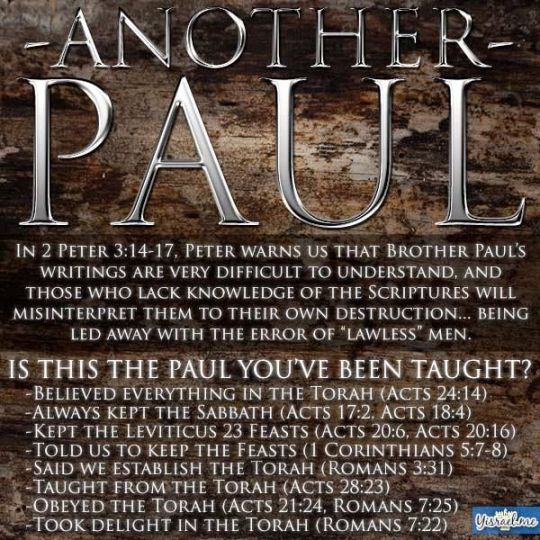
10 notes
·
View notes
Text
Torah Versus Wisdom
If they tell you there is wisdom among other peoples, believe them.
If they tell you there is Torah among other peoples, do not believe them.
Torah, it seems, is distinct from what we generally call wisdom. Even the term “divine wisdom” is insufficient.
Our universe, after all, is composed of divine wisdom—yet Torah is more than the universe. Our environment, our bodies, and even the psyche with which we observe all of these, all are of unfathomable design. “How wondrous are Your works, O YeHoVaH,” the Psalmist declares. “You made all of them with wisdom!” The opening words of the Torah, “In the beginning Elohim created …” are rendered in the Jerusalem Targum as “With wisdom did Elohim create.”
The rabbis of the Talmud even taught us that the Torah is the blueprint of the universe:
The way the world works, when a mortal king builds for himself a palace, he doesn’t build it on his own accord. Rather, he builds according to the advice of an architect. As for the architect, he also does not rely on his mind alone, but he has sketches and worksheets to know how to construct the rooms and how to construct the doorways. So too, the Holy One, blessed be He, looked in the Torah and created the world.
Yet the laws of Torah are something beyond the laws of nature.
So what is the difference between wisdom and Torah? The distinction is a simple one—between what is and what should be: Wisdom tells you all that the Creator created and all that could come from it. Torah tells you what the Creator desires from His creation, and how it will be achieved.
For example, wisdom tells you that how you treat others is bound to come back to you. It’s up to you to decide whether you want that coming back or not.
Wisdom tells you that holding on to property that doesn’t belong to you might not be a good idea—not for you nor for the people around you. But it’s up to you to decide whether or not to suffer the consequences for the sake of the immediate benefits.
Torah, on the other hand, doesn’t simply inform; it instructs. The Torah is YeHoVaH, who creates the universe and sustains its existence at every moment, saying, “Whether you understand or not, whether you can justify yourself or not, don’t steal.” That’s taking a step beyond wisdom.
Indeed, in many instances, the Torah will instruct you to do something that is beyond your understanding. Here again, you listen—not just because you are wise enough to know that the instructions of the One who created heaven and earth are not always going to fit into your understanding, but also because these are instructions, after all, of the Creator of heaven and earth.
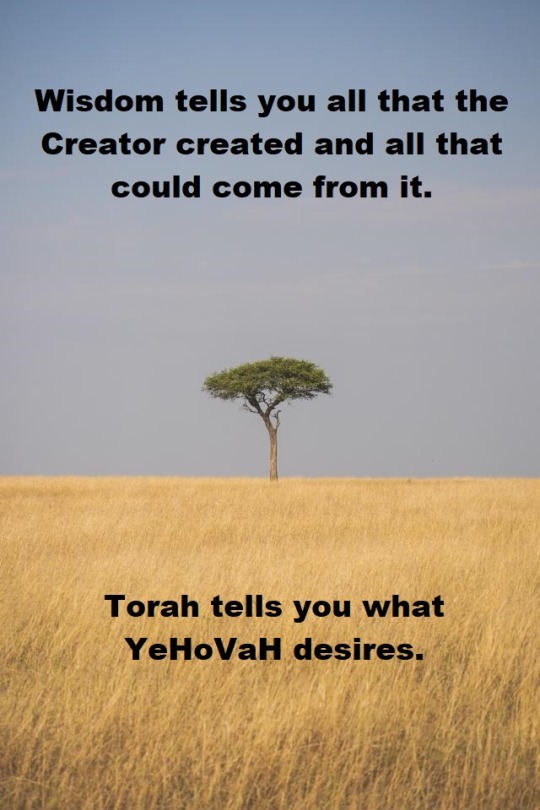
11 notes
·
View notes
Text
How we get YAH from YehovAH
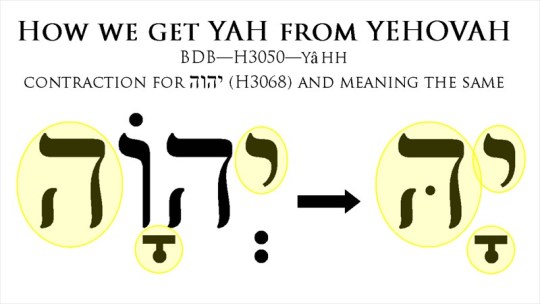
Proponents of non-Hebrew pronunciations of יהוה insist that the poetic shortened form Yah (יה) proves how to pronounce the Name of God. This is simply not true.
No one is disputing that YAH is a reference to יהוה that exists in the Tanakh, although rare compared to the 6827 times יהוה is written. At the end of this post I share all 42 verses in the 4 books of the Tanakh where YAH appears. Also, no one is disputing that there are many theophoric names which end in -yahu or -yah. The dispute comes in with those who make up their own version of Hebrew about how theophoric names begin. (Hebrew theophoric names combine a Hebrew root of specific meaning with the name Yehovah.)
Yah is formed by taking the first and last letter of YehovAH (YAH) to express an abbreviation. It’s vowel is Kamatz from the emphasized final syllable of YehovAH’. To attempt to build the Name of God from its abbreviated form is like the tail wagging the dog.
Please check out the full article:
http://seekingtruth.info/.../the-yah-confusion-and-the.../
9 notes
·
View notes
Text
Where I might find HIM!
Job 23:3 If only I knew where to find Him, I would come to His dwelling-place!
In Job's uttermost extremity he cried after YHVH. The longing desire of an afflicted child of Elohim is once more to see his Father's face.
His first prayer is not "O that I might be healed of the disease which now festers in every part of my body!" nor even "O that I might see my children restored from the jaws of the grave, and my property once more brought from the hand of the spoiler!" but the first and uppermost cry is, "O that I knew where I might find HIM, who is my Elohim! that I might come even to his seat!"
YHVH's children run home when the storm comes on. It is the heaven-born instinct of a gracious soul to seek shelter from all ills beneath the wings of Yehovah. "He that hath made his refuge YHVH," might serve as the title of a true believer.
A hypocrite, when afflicted by YHVH, resents the infliction, and, like a slave, would run from the Master who has scourged him; but not so the true heir of heaven, he kisses the hand which smote him, and seeks shelter from the rod in the bosom of Yehovah who frowned upon him.
Job's desire to commune with YHVH was intensified by the failure of all other sources of consolation. The patriarch turned away from his sorry friends, and looked up to the celestial throne, just as a traveler turns from his empty skin bottle, and betakes himself with all speed to the well. He bids farewell to earth-born hopes, and cries, "O that I knew where I might find my Yehovah!"
Nothing teaches us so much the preciousness of the Creator, as when we learn the emptiness of all besides. Turning away with bitter scorn from earth's hives, where we find no honey, but many sharp stings, we rejoice in HIM whose faithful WORD is sweeter than honey or the honeycomb. In every trouble we should first seek to realize YHVH's presence with us. Only let us enjoy HIS gentle love, and we can bear our trials and tribulations with a willing heart for HIS dear sake.
8 notes
·
View notes
Text
13 notes
·
View notes
Text
9 notes
·
View notes
Text
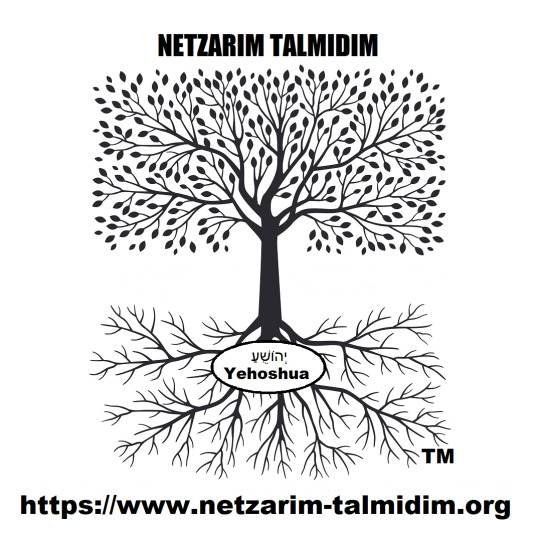
Remember: you do not bear the root, but the root bears you!
Rom 11:17 And if some of the branches were broken off, and you, being a wild olive tree, have been grafted in among them, and came to share the root and fatness of the olive tree,
Rom 11:18 do not boast against the branches. And if you boast, remember: you do not bear the root, but the root bears you!
If some of the branches, that is, unbelieving individual Jews but not the whole Jewish people, were broken off, removed (temporarily, not permanently! Rom_11:11-12, Rom_11:23-24) from being eligible to receive what Yehovah G-d has promised, and you Gentiles (Rom_11:13), a wild olive, were grafted in among them, among the branches which are still part of the tree, the Messianic Jews, the Jewish nation as represented by its Messianic Jewish community, and have become equal sharers in the rich root of Yehovah G-d's cultivated olive tree, then don't boast as if you were better than (literally, "don't boast against") the natural branches, neither the ones still in place (the Messianic Jews) nor the ones broken off (the non-Messianic Jews). Gentile pride in having been joined to the "chosen people" is utterly out of place, particularly when directed against those very people! As Sha'ul writes elsewhere, "After all, what makes you so special? What do you have that you didn't receive as a gift? And if in fact it was a gift, why do you boast as if it weren't?" (1Co_4:7)
However, if you do boast, for whatever reason-carelessness, thickheadedness, or actual malice-it ought to help you stop if you remember that you are not supporting the root, but the root is supporting you. Or, to make Sha'ul's point as clear as it can be, whether the root is Yeshua, Avraham, the Patriarchs, the Messianic Jews or all the Jews (see Rom_11:16), it is a Jewish root, and don't you forget it! The Jewish community sometimes draws a picture of the Jew who comes to faith in Yeshua as someone doubly unwelcome, rejected both by other Jews and by the Gentile majority in the Church as well. It's easy enough to understand why a Messianic Jew might be rejected by some in the Jewish community, but why did the image of his being rejected by the Church even arise? It came from Gentile Christians who forgot Sha'ul's warning and regarded the Jewish believer in their midst not as a natural branch of the olive tree into which they were grafted, but as an alien.
Shifting the perspective slightly, notice that Sha'ul is reminding Gentile Believers that trusting Yehovah G-d also means joining
G-d's people. It is no different now than it was with Ruth: "Your people shall be my people and your Elohim my Elohim" (Ruth_1:16). Gentile Believers have joined Yisrael, not the reverse (see also Eph_2:11-16). For a Gentile Believer to look down on the people he has joined is not only chutzpah and ingratitude but also self-hate.
Isa 11:1 But a branch (a Netzar) will emerge from the trunk of Yishai (Jesse), a shoot will grow from his roots.
17 notes
·
View notes
Text

"But for me, it is good to be near Elohim. I have made my refuge in the Master יהוה, to declare all Your Works." - Psalm 73:28 (The Scriptures)
38 notes
·
View notes
Text

"YHVH (YEHOVAH) OUR KING"
13 notes
·
View notes
Text

"THE WORD OF YHVH ALMIGHTY"
7 notes
·
View notes
Text
Hebrew Sacred Names
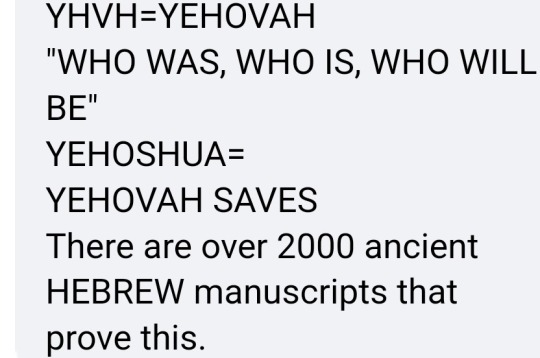
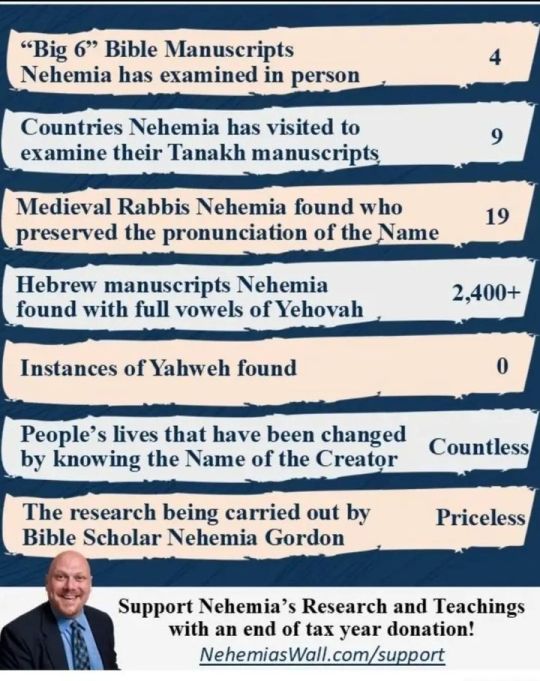
Dr. Nehemia Gordon is the creator and host of the Hebrew Voices podcast, has written two popular books on the Hebrew origins of Christianity, and is active in interfaith dialogue. Gordon earned his PhD from Bar-Ilan University in Biblical Studies, writing his doctoral dissertation on the "The Writing, Erasure, and Correction of the Tetragrammaton in Medieval Hebrew Bible Manuscripts." Gordon also holds a Masters Degree in Biblical Studies and a Bachelors Degree in Archaeology from the Hebrew University of Jerusalem. He has worked as a translator on the Dead Sea Scrolls and a researcher deciphering ancient Hebrew manuscripts. Gordon is currently working on cutting edge research utilizing Hebrew manuscripts of the Bible.
20 notes
·
View notes
Text
אֲדֹנָ֣י יֱהֹוִ֗ה נָ֤תַן לִי֙ לְשׁ֣וֹן לִמּוּדִ֔ים לָדַ֛עַת לָע֥וּת אֶת־יָעֵ֖ף דָּבָ֑ר יָעִ֣יר ׀
בַּבֹּ֣קֶר בַּבֹּ֗קֶר יָעִ֥יר לִי֙ אֹ֔זֶן לִשְׁמֹ֖עַ כַּלִּמּוּדִֽים׃
The Lord GOD gave me a skilled tongue,
To know how to speak timely words to the weary.
Morning by morning, He rouses,
He rouses my ear
To give heed like disciples.
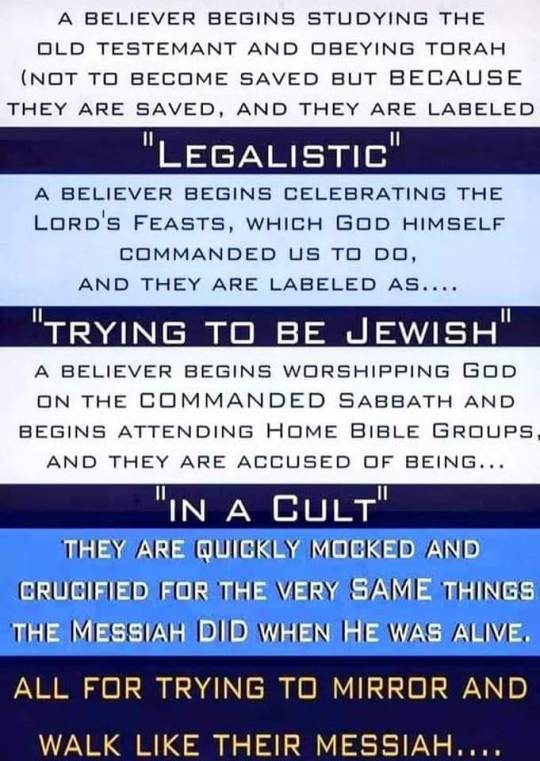
14 notes
·
View notes


